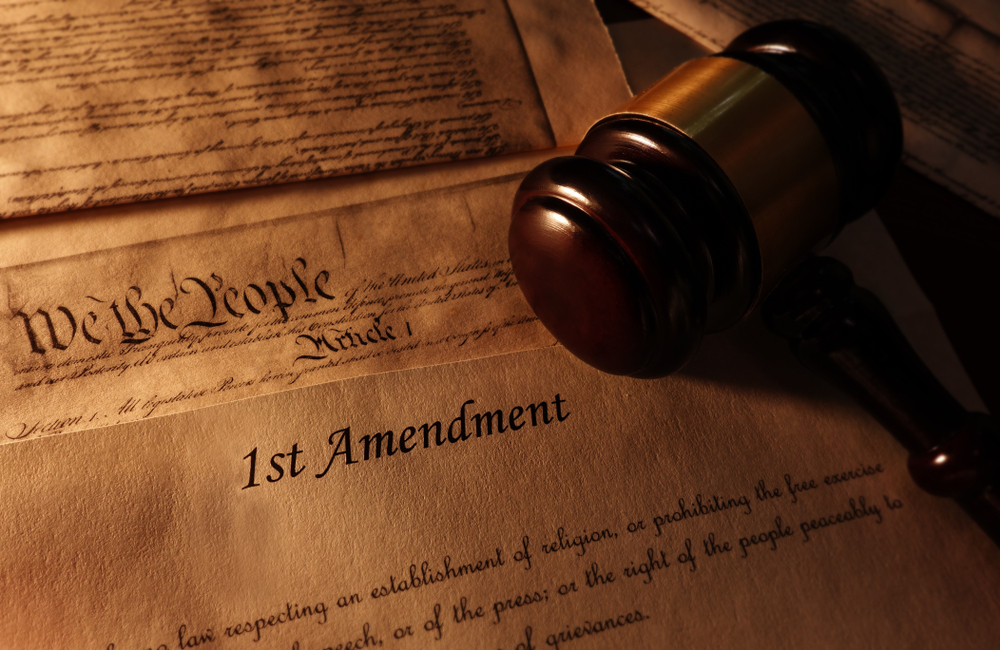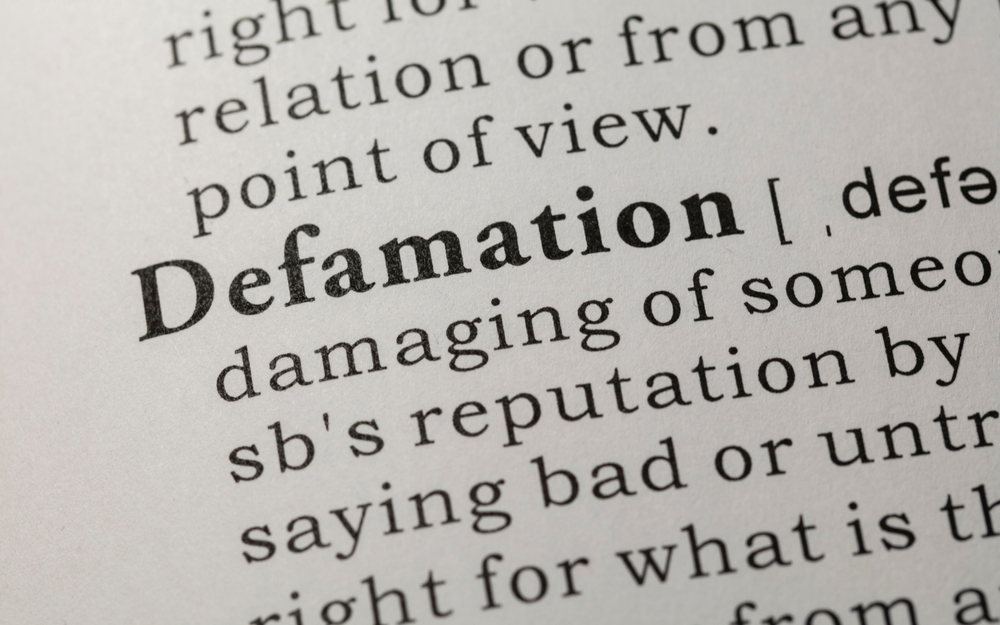The news is filled with a buzz about conspiracy theories and networks settling lawsuits about false statements. Regardless of the substance of these disputes, all of them circle around some basic, age-old legal concepts.
What is Defamation?
Defamation refers to the act of making a false statement (or a series of false statements) about another person or entity that harms their reputation, usually resulting in damage to their personal or professional reputation. Defamation can take many forms, including slander, which involves the spoken word, and libel, which involves the written or published word.
To prove defamation, the party that is claiming to be harmed by the false statement (the plaintiff in a civil lawsuit) typically must demonstrate that the statement made about them was false, that the false statement was communicated to a third party, and that the false statement caused harm to their reputation or resulted in some other type of damage, such as lost business or job opportunities. Some jurisdictions have a heightened standard where the plaintiff may need to show that the statement was made with malicious intent or with reckless disregard for the truth.
Defamation can have serious consequences, both for the individual or business making the statement and for the person or business who is the subject of the statement. If found liable for defamation, the defendant (the person or business accused of making the false statement) may be required to pay damages to the plaintiff, which can include compensation for harm to their reputation, as well as punitive damages designed to punish the defendant for their behavior. In addition, the defendant may be required to retract or correct the false statement and may be subject to other legal penalties, such as fines or imprisonment.
History of Defamation
The concept of defamation has existed in various forms in many societies, as a means to protect one’s reputation or honor. Here are some notable events in the history of defamation:
- Ancient Greece: In ancient Greece, it was considered a serious offense to defame someone’s character or reputation. The famous orator Demosthenes once said, “A good name is more valuable than money.” Defamation was punished with fines, public shaming, or even exile.
- Roman Empire: The Roman Empire had strict laws against defamation, and the penalty for slander could include being forced to wear a sign around one’s neck with the defamatory statement written on it. In some cases, the offender could be put to death.
- English Common Law: In medieval England, defamation was a criminal offense punishable by imprisonment or even death. However, in the 17th century, the law began to recognize a distinction between spoken (slander) and written (libel) defamation. Libel became a civil offense, and the burden of proof shifted to the plaintiff to prove that the statements made were false and had caused harm.
- American Law: In the United States, defamation is protected by the First Amendment, which guarantees freedom of speech and the press. However, there are limits to this protection, and individuals can be held liable for making false and damaging statements about others.
Libel and Slander
Libel is a type of defamation that involves a false and damaging statement that is written or published, such as in a newspaper, magazine, book, or on the internet. Slander is a type of defamation that involves a false and damaging statement that is spoken, rather than written. Examples of slander may include false statements made during a speech, on television, or during a conversation with another person. In the modern era of news gathering and production, a false statement spoken during a television broadcast is often then written or published when a transcript of the spoken broadcast is then posted as a news article on the news outlets internet site.
Slander and libel are both types of defamation, but they differ in terms of the medium in which the false statement is communicated.
In general, libel is considered to be more damaging than slander because written statements have a wider reach and can be preserved for longer periods of time. Slander, on the other hand, is more transient and may only be heard by a limited audience.
Depending on the legal jurisdiction, the legal standards for proving libel and slander may differ. For example, in some places, a plaintiff may need to show that the statement was published with a certain degree of fault, such as negligence or actual malice, in order to prove libel. In contrast, a plaintiff may only need to show that the statement was false and caused harm to their reputation in order to prove slander.
Overall, while libel and defamation are often used interchangeably, it’s important to recognize that libel is a specific type of defamation that involves written or published statements, while defamation can refer to both written and spoken statements.

Defamation and the First Amendment
Defamation is a legal issue that can sometimes come into conflict with the First Amendment of the United States Constitution, which protects the freedom of speech and of the press.
While the First Amendment provides broad protections for speech and expression, it does not protect false statements that harm the reputation of others. Thus, the law of defamation allows individuals or businesses to seek redress for false and damaging statements made about them.
However, the law of defamation must also be balanced against the First Amendment rights of the defendant. In order for a plaintiff to succeed in a defamation lawsuit, they must typically demonstrate that the false statement was made with actual malice, meaning that the defendant knew that the statement was false or made the statement with reckless disregard for the truth. This high standard is designed to ensure that the law of defamation does not unduly chill free speech or the press. It also reflects the importance of allowing robust and open debate on matters of public concern, even if that debate includes harsh or critical commentary.
Overall, while the First Amendment provides broad protections for free speech and expression, it does not shield individuals or entities from liability for making false and damaging statements about others. The law of defamation seeks to balance these competing interests and to ensure that individuals and entities can seek redress for false statements that harm their reputation, while also protecting the rights of defendants to engage in robust and open debate.
Defenses to Defamation
In many ways, the defenses a person who is alleged to have made a false statement can assert are almost as famous or newsworthy as the defamation itself. There are several defenses to defamation that a defendant charged with defamation can use in a court of law. The availability and effectiveness of these defenses may vary depending on the jurisdiction and the specific facts of the case. Here are some common defenses to defamation:
- Truth: If the statement at issue is true, it cannot be considered defamatory. In other words, the defendant can argue that the statement was not defamatory because it was factually accurate.
- Privilege: In some situations, individuals have a legal “privilege” to make statements that might otherwise be defamatory. For example, statements made in the course of a legislative or judicial proceeding are generally privileged.
- Consent: If the plaintiff consented to the publication of the statement, the defendant may be able to argue that the plaintiff cannot claim defamation.
- Opinion: Statements of opinion are generally protected by the First Amendment and are not considered defamatory unless they imply the existence of false facts.
- Fair comment: Statements that are made in good faith and are based on a matter of public interest or concern may be protected by the defense of fair comment.
- Statute of limitations: In some jurisdictions, there is a statute of limitations that limits the time period during which a plaintiff can bring a defamation claim. If the plaintiff waits too long to file a lawsuit, the defendant may be able to argue that the claim is barred by the statute of limitations.
It is important to note that the availability and effectiveness of these defenses may vary depending on the jurisdiction and the specific facts of the case. It is always advisable to seek the advice of a qualified attorney if you are facing a defamation claim or considering bringing a defamation lawsuit.
Tort or Crime?
Defamation can be both a tort and a crime, depending on the jurisdiction and the circumstances of the case.
As a tort, defamation is a civil wrong that involves the publication of a false statement that harms the reputation of an individual or organization. In this context, the plaintiff can sue the defendant for damages or seek other remedies in a civil court.
As a crime, defamation is a criminal offense that involves the publication of a false statement that is intended to harm the reputation of an individual or organization. In some jurisdictions, criminal defamation laws are used to punish individuals who make false and damaging statements about others.
However, it is important to note that in many countries, including the United States, criminal defamation laws are rarely enforced and are often seen as a threat to free speech. In these countries, defamation is primarily treated as a civil matter.
It is always advisable to seek the advice of a qualified attorney if you are facing a defamation claim or considering bringing a defamation lawsuit, as the legal framework and potential remedies may vary depending on the jurisdiction and the specific circumstances of the case.






